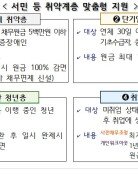Manufacturers See 707.7 Billion Won FTA Surplus with U.S.
Manufacturers See 707.7 Billion Won FTA Surplus with U.S.
Posted April. 10, 2007 07:36,
The Korea Institute for Industrial Economics and Trade (KIET) performed an analysis of what may happen when the Korea-U.S. FTA (KORUS FTA) goes into effect. Their report was released on April 9. According to the report, South Korea`s trade surplus with the US will increase an average of $745 million dollars (707.7 billion won) annually for the next 10 years.
The government and the business sectors forecast that the KORUS FTA will improve the nations sovereignty ratings and lower the risk of trade disputes.
Deputy Prime Minister and Minister of Finance and Economy Kwon O-kyu took a cautious attitude toward the report, saying, What we must do to prepare for the KORUS FTA is to develop our economic management framework.
Manufacturers Will Make More Gains-
The Ministry of Commerce, Industry and Energy hosted an industrial strategy forum for the KORUS FTA on April 9 at the Grand Intercontinental Hotel, Samseong-dong, Gangnam-gu, Seoul. In the forum, KIET stated that South Korea will export $1.327 billion more and import about $582 million more annually to the U.S. for the next 10 years of the KORUS FTA. That means South Korea will record $745 million more surplus on a year on year basis.
In a detailed analysis, the reports forecast that the auto industry will get the most benefits and that the car industrys annual trade surplus will grow $741 million more every year. The textile industry and the electrical and electronics industries are also estimated to get more money than before.
The chemical and general machinery sectors will be faced with more deficits, and the steel industry will not be affected by the KORUS FTA, the report said.
The analysis has limitations, however, as it deals only with manufacturers.
Experts from the forum stressed that Korea needs to create friendlier environments for overseas investors to maximize the positive effects of the KORUS FTA.
Professor Ahn Se-young of the Graduate School of International Studies at Sogang University said, For the last two to three years, U.S. investors in Mexico moved to China. We should know that the KORUS FTA cant guarantee a favorable investment environment for foreign investors.
His comment refers to the fact that when NAFTA went into effect, investment from the U.S. to Mexico rose, but as time went on, Chinas less expensive labor costs enables China to be a better place for U.S. firms to do business.
Better Credit Ratings, More Trade Disputes-
Heo Kyung-wook is the chief of International Finance Bureau at the Ministry of Finance and Economy. In his meeting with reporters, he said, The KORUS FTA supports a favorable outlook for improving South Koreas sovereign ratings. We hope for good news from Moodys in April or May.
The Korea Trade-Investment Promotion Agency (KOTRA) predicted, U.S.-Korea bilateral trade relations will experience progress as discontent from the agriculture and auto industry of the U.S. will become significantly weaker. KOTRAs prediction came after comparing the release results from the KORUS FTA negotiations to 2007 National Trade Estimate Report on Foreign Trade Barriers (NTE) of the Office of the United States Trade Representative (USTR).
abc@donga.com buddy@donga.com






